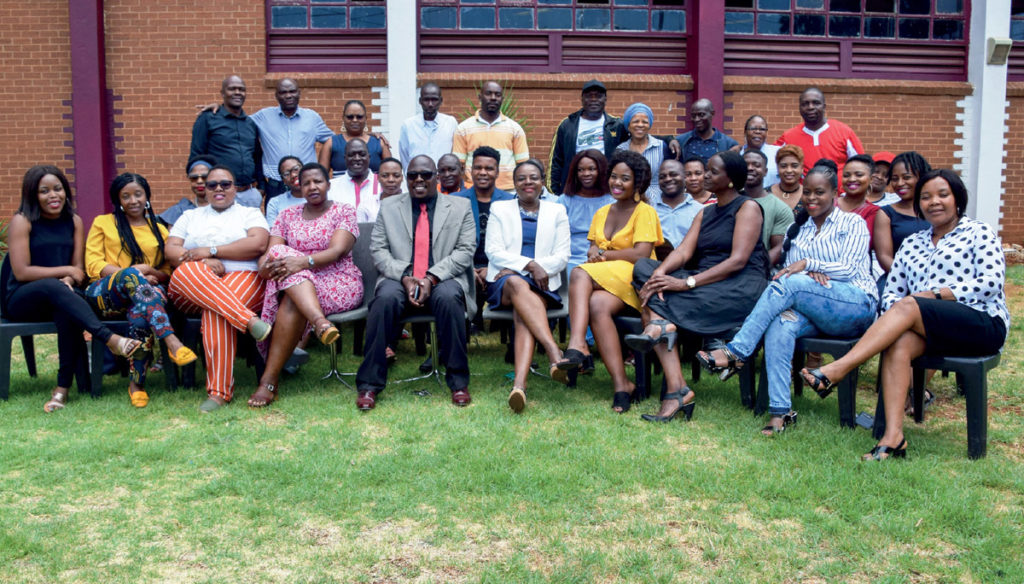Principal at George Khosa Secondary School, Muzawenkosi Nzuza
The face of township education is slowly changing for the better, an analysis of the recent matric results reveals. This can be attributed to a new breed of principals, who have injected a renewed sense of confidence, passion and commitment among teachers, learners and the community. They have turned their schools around to be academically competitive despite a range of challenges they have to constantly battle.
Two Soweto-based high institutions — George Khoza Secondary School and Forte High School — represent this growing new wave. They are both based in Dobsonville, about 20km from Roodepoort.
George Khoza Secondary School
George Khoza became the toast of the town when it scored a 97.4% pass rate, with one learner bagging five distinctions. The pass rate translates into 50 bachelor passes, 40 diploma passes and 12 higher certificates passes. It also achieved 100% passes in English, accounting, isiZulu, isiXhosa, Setswana, tourism, history and life orientation.
The school’s acting principal, Muzawenkosi Nzuza, praised his predecessor for putting systems in place that helped lay the firm academic foundation on which their current performance is based. “We also introduced several learning programmes and initiatives to assist learners to prepare and cope well with their school work. Some of these include: introduction of our own school improvement programmes, revision classes and pre-preliminary examinations to diagnose learning areas where learners are weak,” Nzuza said.
In 2016 they launched an “intensive study revision initiative” with the help of the provincial department of education. In addition, he said they also invite experts in specific learning areas to do proper examination coaching and tips for the learners. “Traditionally our preparations start at grade eight. The idea is to prepare, monitor and track learner performance so that by the time they reach grade 12 they are adequately prepared,” Nzuza said.
He also acknowledged the commitment, hard work and selflessness displayed by his staff. He said the other key ingredient of their success is to ensure that there is buy-in from both teachers and parents’ regarding his vision for the school. “And once this is secured, everything falls into place — we all pull in one direction to achieve one common goal — to assist learners.” Nzuza said most learners come from impoverished households and face a whole range of socioeconomic problems that affect their studies. “Although we do our best to intervene, we would welcome donations from outside to augment these efforts.”
 Forte High School staff 2019
Forte High School staff 2019
Forte High School
Mukosi Mudavhi took the reins at Forte High School in 2011; by then the school’s performance was already above 80%. He increased it to 90% in the following years, although in 2015 and 2016 it slumped back to the 80% level. He said this was as a result of the poor results in geography and business studies. “The educators who taught the subjects at the time let us down. They were just not equal to the task, and I had to intervene quickly to stabilise the situation,” said Mudavhi.
This year his school produced a 96% pass rate from a class of 282 pupils: 271 learners got straight passes, 179 obtained bachelors’ passes, 78 got diplomas and 14 received higher certificates.
Mudavhi said the good performance is a direct outcome of his strategies, which entail, among others, greater parental involvement; intervening where necessary to change and deploy teachers to different learning areas during the year; meeting with teachers every term to analyse the results; and encouraging “team teaching”, where teachers across the grades collaborate on a specific subject area. They have also introduced early morning and afternoon studies, including weekends and school holidays. He said this year they are targeting a 98% pass rate.
He strongly believes the school would not have scored big without the hard work and commitment of his staff. “They always put the interest of the learners first,” said Mudavhi.
He said teachers also “adopt” learners who perform below par. “The purpose here is for teachers to get involved and understand the circumstances of the learners, both at school and at home front. This enabled us to make meaningful interventions. Where possible we do work together with and solicit assistance from relevant organisations and experts.”
– Thabo Mohlala